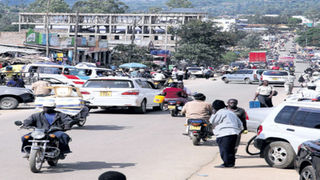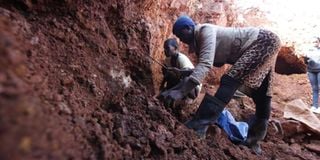
A section of Migori town.
|Migori
Premium
How Macalder town, the sleepy Migori gold belt got its name
Like Disney cartoon characters, who are frozen in time and never grow up, rusty metal sheets and old buildings greet you as you enter Macalder town, one of the oldest gold mining towns in Migori County.
Although the town has existed since the colonial era, it still reels from the shackles of underdevelopment, decades after the colonialists left.
The town is quiet, appearing deserted, because the gold prospectors, a majority of whom are artisanal miners, work underground.

Macalder Mines ruins in Migori County.
But how did the little-known gold belt get its name?
Residents well versed in the town’s history say Macalder was run by British colonialists. Locals were not allowed to engage in mining, which was a preserve of whites.
A man called Mark Holder, a Briton and the first colonial gold prospector in the region, started the gold rush in 1935.
“Macalder was a regional hub then, and the first town in the southern Nyanza region to have an airstrip and a hospital fully furnished with a theatre,” recalls Mzee Manaseh Owino.
Residents often provided cheap labour to Mark Holder and his team of gold prospectors, Mzee Owino says. In return, they would be given food, clothes and a few coins.

Women mine gold at Macalder Mines in Nyatike Constituency in Migori County in 2019.
Unable to pronounce the names correctly, residents would often be heard saying, “Wadhi e magang ka Macalda” (We are going to work at Mark Holder’s mines).
In 1966, shortly after independence, the colonial firms left the mines, ending the gold rush that had revolutionised the area into a thriving business hub.
The airstrip and other amenities built by colonialists still stand today, albeit in a dilapidated state.
Residents say the town, the headquarters of Nyatike sub-county, is a pale shadow of its former self. Neighbouring towns such as Migori, Masara, Sori and Muhuru Bay that came later have overshadowed Macalder.
“The town has refused to grow. We don’t have any tarmac road in Nyatike, and we are still relying on infrastructure set up by colonialists,” observes Mr Kepher Ochieng.
Mr Felix Okwanyo, another resident, says that though the town has huge chunks of government land for development, potential investors shy away from the town, because there is no proper planning to allow development.
“There is fear that if investors set up permanent structures, they will be demolished when the government finally sets up a town plan. This has kept most of the people away as there are no storey buildings, tap water and other social amenities,” Mr Okwanyo says.

Macalder area in Nyatike, Migori.
Mr William Odhil, an elder, notes that though Macalder has been producing gold since colonial times, nothing comes back to the community.
Even employees of the national government and local organisations live in Migori town and commute to Macalder.
“Gold prospecting is nomadic and is often dictated by a rush. This mentality has seen a flight of investments as people see Macalder as a pass-through area where one comes to make money and leaves,” Mzee Odhil says.
The two say the problem is compounded by another factor. In a bid to control the gold trade, the colonialists hived off large tracts of land around Macalder. The land was passed to the national government and later to the county administration.
Private land around Macalder is located three to five kilometres away, with small private plots in the town.
But with the opening of a Rongo University satellite campus in Macalder, and Kisii University planning to open a campus, there is renewed hope that the county government will fast-track the planning of the town and give room for potential investments.
Nyatike MP Tom Odege urges Rongo University’s vice-chancellor, Prof Samuel Gudu, to develop courses that he says will be key in reviving the town and the area, which sits near Lake Victoria.
“The Macalder campus is undoubtedly going to bring a ray of hope to locals and attract move investors. I am urging the mother institution to train our people on the blue economy and mining so as to tap the readily available resources,” Mr Odege said when he handed over the campus to Rongo University last month.
The Sh18.6m college, comprising eight lecture halls, two ablution blocks, two water tanks, a borehole and a solar system, sits on 59 acres provided by the national government and the Migori County government.
“Our people should invest in building hostels and other social amenities in the area to tap the business opportunities that the new campus will bring,” Mr Odege said.
Locals now want the government to lease out plots around the campus and ensure title deeds are issued to spur development in the once sleepy town.





